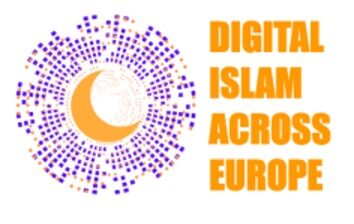
Gary R Bunt (UK Team and Website data analysis)
Anna Grasso (UK Team and Website data analysis)
This archive is part of the Digital Islam Across Europe project’s collection. One of the DigitIslam project outputs focuses on website data and collection analysis. The objective is to identify, catalogue and analyse Muslim organisations’ and actors’ websites (Online Islamic Environments or OIEs) from these different countries.1
This collection showcases websites focused around organisations in the UK tied to the Shia branch of Islam2.
Part of the organisations we archived while based in the UK have a global scope. Examples of these are the “Al Khoei Foundation”, the “Imam Ali Foundation”, the “World Federation of Khoja Shia Ithna-Asheri Muslim Communities” among others. Nonetheless, most of the institutions in our collection are locally based in the UK (in and around London but also in Birmingham, Edinburgh, Manchester, Cardiff as well as other cities and towns).
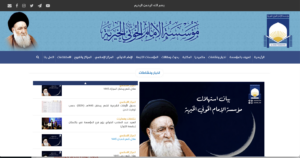
Al Khoei Foundation website
Most of the websites in this collection are primarily written in English despite a few exceptions such as the “Al Khoei Foundation” and “The Mahdi Servants Union” (both mainly in Arabic) or “Imam Ali Foundation”, “Abrar Islamic Foundation” and “Al Jawad Centre Birmingham” (where Arabic and English versions are almost the same).
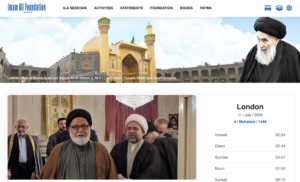
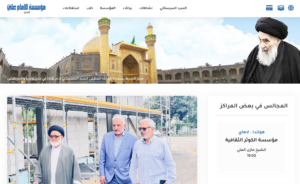
English and Arabic versions of the Imam Ali Foundation website
Whilst most of the organisations in the collection are tied to the mainstream branches of Shia Islam (Twelver/Ithna’ashari) we also find two minorities: the Ismailis and the Rafidah.
Ismailism is a branch of Shia Islam originating in the 8th century due to a succession dispute over the rightful Imam, which split from Twelver Shia. Today, the Nizari Ismaili branch, led by Aga Khan IV*, focuses on development, education, and pluralism. Aga Khan IV, born in 1936 and educated at Harvard, has led Nizari Ismaili Muslims since 1957. He heads the Aga Khan Development Network (AKDN), operating in over 30 countries, headquartered in Portugal with a significant presence in the UK, including offices in London. Three archived websites are tied to this branch “the.ismaili United Kingdom”, “The Institute of Ismaili Studies (IIS)” and “The Ismaili Centre London”.
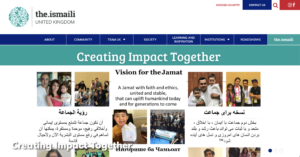
the.ismaili United Kingdom website
The Rafidah (meaning rejectors) are a branch of Shia Islam that reject the two caliphs who succeeded the prophet Muhammad (Abu Bakr and Umar) and solely recognised Ali as his lawful successor. Sheikh Yaser Al-Habib (1979-) a Shia Kuwaiti scholar associated with this branch, sought to reestablish this movement. He founded the “Mahdi Servants Union” to defend this vision. He later established its headquarters in Fulmer, Slough in 2005 after being granted the status of refugee due to his religious stance. There are five websites linked to this branch in the collection: ” The Mahdi Servants Union” (both English and Arabic versions); “The Office of Sheikh Al-Habib”; “Rafida foundation”; “Al-Muhassin Mosque”; as well as a website of the movie that was produced by this organisation in honour of Fatima the wife of Ali called “The Lady of Heaven”.
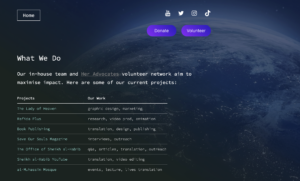
Rafida foundation website mentioning links to the other pages tied to this branch
We were also able to identify a link to a Global Shia organisation based in the UK, the “World Federation of KSIMC” with an organisation in our “Sweden collection”, the “Zainabiya Islamic Centre” in Märsta. This will be included in the analysis of transnational networks.
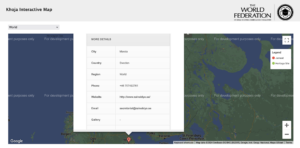
Link to the Zainabiya centre in Sweden on the World Federation website
This archive consists of an initial capture. We will be updating this list in due course to include further discussion on organisations/websites with links to external influences, including Iranian institutions. We believe this data can become a useful tool for researchers and the general public who have an interest in digital Islam across Europe as well as those who are mostly focused on the study of Islam or comparative religion within the British or Western context. Moreover, the analysis of these sites will be part of a wider project output through presentations and publications.
* Prince Karim Al-Husseini (Aga Khan IV) passed away on 4 February 2025 and was succeeded by his son Prince Rahim Al-Hussaini who became the new Aga Khan V.
- For more information on this: https://blogs.ed.ac.uk/digitalislameurope/research-findings/archiving/ back
- For an overview on Shi’ism in cyberspace, see Gary R. Bunt, Islamic Algorithms: Online Influence in the Muslim Metaverse, London: Bloomsbury, 2024) 105-142. More generally, on Shia in the UK see: “Shia Muslims in Great Britain” (2019), Contemporary Islam | Volume 13, issue 3 (Scharbrodt, O., Gholami, R. & Dogra, S.A eds.) https://link.springer.com/journal/11562/volumes-and-issues/13-3; as well as a short introduction by Gilliat-Ray, S. (2010). Muslims in Britain. Cambridge: Cambridge University Press, pp. 61-63. back
Image by mostafa meraji from Pixabay
